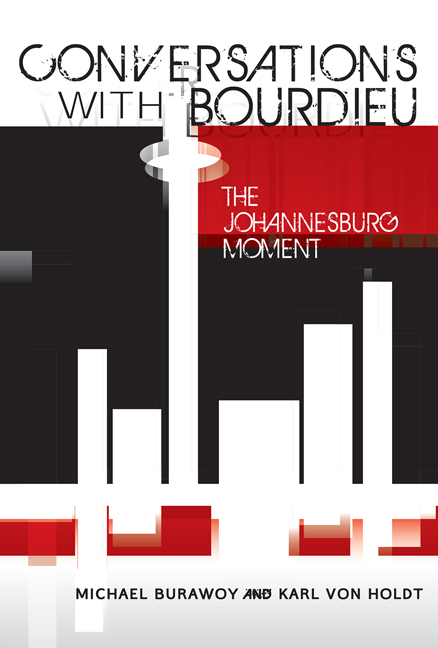Book contents
- Frontmatter
- Contents
- Abbreviations and acronyms
- Preface
- Prologue The Johannesburg Moment
- Acknowledgements
- CONVERSATION 1 SOCIOLOGY AS A COMBAT SPORT
- CONVERSATION 2 Theory and Practice
- CONVERSATION 3 CULTURAL DOMINATION
- CONVERSATION 4 COLONIALISM AND REVOLUTION
- CONVERSATION 5 PEDAGOGY OF THE OPPRESSED
- CONVERSATION 6 THE ANTINOMIES OF FEMINISM
- CONVERSATION 7 INTELLECTUALS AND THEIR PUBLICS
- CONVERSATION 8 MANUFACTURING DISSENT
- Epilogue Travelling Theory
- Bibliography
- Index
Epilogue - Travelling Theory
Published online by Cambridge University Press: 20 April 2018
- Frontmatter
- Contents
- Abbreviations and acronyms
- Preface
- Prologue The Johannesburg Moment
- Acknowledgements
- CONVERSATION 1 SOCIOLOGY AS A COMBAT SPORT
- CONVERSATION 2 Theory and Practice
- CONVERSATION 3 CULTURAL DOMINATION
- CONVERSATION 4 COLONIALISM AND REVOLUTION
- CONVERSATION 5 PEDAGOGY OF THE OPPRESSED
- CONVERSATION 6 THE ANTINOMIES OF FEMINISM
- CONVERSATION 7 INTELLECTUALS AND THEIR PUBLICS
- CONVERSATION 8 MANUFACTURING DISSENT
- Epilogue Travelling Theory
- Bibliography
- Index
Summary
In her Southern Theory (2007), Raewyn Connell problematises the canonical works of metropolitan theory – from the so-called classics of Marx, Weber and Durkheim to the contemporary theories of James Coleman, Anthony Giddens and Pierre Bourdieu. Their silence on the Global South, Connell argues, portends a distinctively Northern perspective, albeit disguised as universalism. In reaction to Northern theory, Connell presents us with a ‘counter-hegemonic’ project that foregrounds social thinkers from the South who have not made it into the conventional sociological tradition – from the Middle East, three Iranian thinkers: al- Afghani, Al-e Ahmad and the more contemporary Ali Shariati; from Latin America, the Argentinian economist Raúl Prebisch, the Brazilian sociologist Fernando Enrique Cardoso and the Mexican anthropologist García Canclini; and from South Asia, subaltern thinker Ranajit Guha, anthropologist Veena Das and public intellectual Ashis Nandy. From Africa, she chooses the Dahomeyan philosopher Paulin Hountontdji and the South African writer, politician, historian and newspaper editor Sol Plaatje. He was the first general secretary of the ANC and author of Native Life in South Africa, a denunciation of the 1913 Natives’ Land Act. Around such forgotten or overlooked thinkers, Connell proposes to build an alternative social theory.
There is no doubt about the importance of her intervention – the latest in a long history of challenges to the hegemony of Northern sociology. Connell perhaps goes further than others in combining an assault on ‘classical theory’ with a global search for alternatives to Western and Northern social theory. She thereby underlines just how narrow are the geographical origins of ‘recognised’ or ‘legitimate’ sociological theory, both in their canonical and contemporary incarnations. Theory building appears to be the monopoly of the few, situated in elite universities of the Global North.
Important though her critique of the canon is, her sketch of ‘Southern theory’ is not without problems of its own. How feasible is an alternative Southern theory in the face of the unevenness of the distribution of resources – the concentration of the most lavishly funded universities and research establishments in the North, where working conditions are incomparably superior to anywhere else?
- Type
- Chapter
- Information
- Conversations with BourdieuThe Johannesburg Moment, pp. 210 - 218Publisher: Wits University PressPrint publication year: 2012

